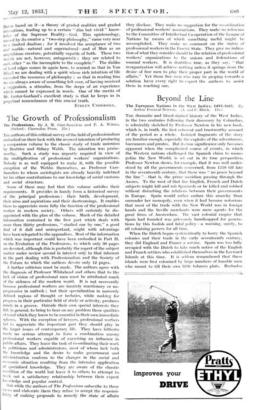The Growth of Professionalism
The Professions. By A. M. Carr-Saunders and P. A. Wilson. (Oxford : Clarendon Press. 25s.) Tin: authors of this critical survey of the field of professionalism embarked on their task with the avowed intention'of producing a companion volume to the classic study of trade unionism by Beatrice and Sidney Webb. The intention was praise- worthy. Such a study was urgently required in view of the multiplication of professional workers' organizations. Nobody is as well equipped to make it, with the possible exception of the Webbs themselves, as Professor Carr- Saunders to whom sociologists are already heavily indebted for his other contributions to our knowledge of social customs and social structure.
Some of these may feel that this volume satisfies their requirements. It provides in handy form a historical survey of the principal professions : their birth, development, their aims and aspirations and their shortcomings.. It enables them to appreciate more fully the function of the professional worker in modern society. Others will certainly be dis- appointed with the plan of the volume. Much of the detailed information contained in the first part which deals with more than thirty professions, "studied one by one," a good deal of it dull and unimportant, might with advantage have been relegated to the appendices. Most of the information which was important could -have been embodied in Part II, on the Evolution of the Professions, to which only 30 pages are devoted, although this is probably the aspect of the subject matter under review second in interest only to that inherent in the part dealing with Professionalism and the Society of the Future to which the authors devote only 12 pages.
A further criticism must be made. The authors agree with the diagnosis Of Professor Whitehead and others that to the lack of vision of professional men must be attributed- much of the sickness of the modern world. It is nat necessarily because professional workers are innately reactionary or un- progressive in outlook ; but their specialization in narrowly defined regions of thought or technics, while making for progress in their particular field of study or activity, produces minds in a groove. Outside their own special interests they fail, in general, to bring to bear on any problem those qualities of mind which they know to be essential in their own immediate spheres. With the exception of lawyers, professional workers fail to appreciate the important part they should play in the larger issues of contemporary life. They have hitherto made no serious attempt .to form a combination among professional workers capable of exercising an influence in public affairs.- They leave the task of co-ordinating their work to politicians and administrators, most of whom lack both the knowledge and the desire to make government and administration conform to the changes in the social and economic situation resulting from the intensive application of specialized knowledge. They are aware of the chaotic Condition of the world but leave it to others to attempt to work out a satisfactory relationship between their expert knowledge and popular control.
But while the authors of- The Professions subscribe to these views and elaborate them they refuse to accept the responsi- bility of making- proposals to remedy the state of affairs
they disclose; They make no suggestion for the co-ordination of professional workers' associations. They make no reference to the Committee of Intellectual Co-operation of the League of Nations by means of which something useful might be accomplished. They make no comment on the status of professional workers in the Fascist State. • They give no indica- tion of what they consider should be the relation of professional workers' organizations to the unions and federations of manual workers; It is doubtless true, as they say, " that reorganization will achieve nothing unless it springs from the desire of free men to play their proper part in the world of affairs." Yet those free men who may be groping towards a solution have every right to expect the authors to assist them in reaching one.
































 Previous page
Previous page